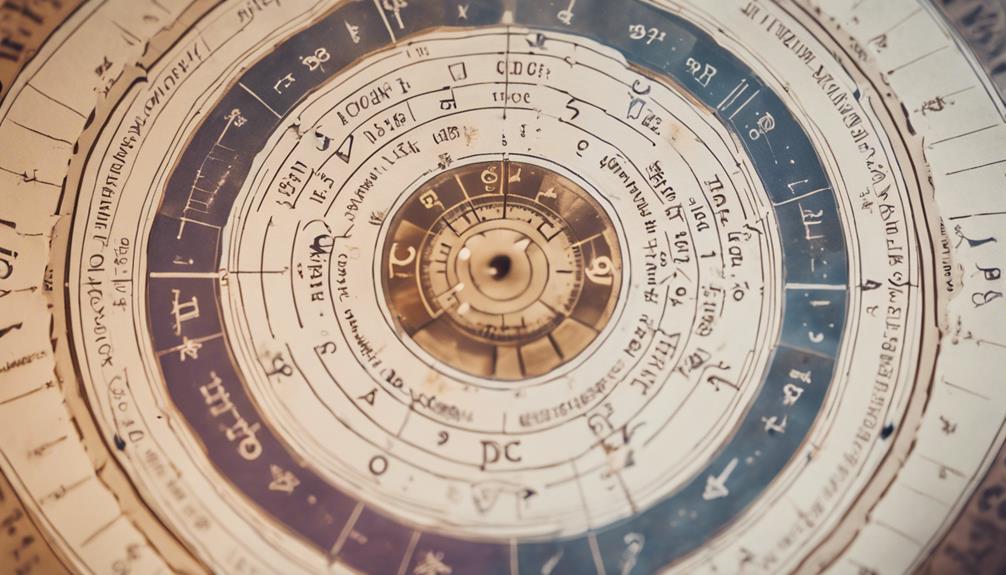How To Find Chart Ruler Astrology
Navigating the intricacies of astrological chart interpretation begins with identifying the chart ruler, a pivotal element in personal astrology. The first step involves pinpointing the Ascendant sign, which requires precise information about one's birth date, time, and location. This Ascendant then leads to the ruling planet, offering profound insights into one's inherent traits and life path. But what makes the chart ruler so influential, and how does it shape the broader astrological narrative? These questions pave the way for a deeper exploration into the mechanics and significance of the chart ruler in astrology.
Key Takeaways
- Determine your Ascendant Sign by using your exact birth date, time, and location.
- Identify the ruling planet associated with your Ascendant Sign.
- Locate the ruling planet within your natal chart.
- Examine the house placement of the ruling planet for key life areas.
- Analyze aspects between the ruling planet and other planets for additional insights.
Understanding the Chart Ruler

Understanding the chart ruler is essential for grasping the foundational dynamics that shape an individual's personality and life path in astrology. The chart ruler is the ruling planet of a person's birth chart, representing the strongest energy that influences their character and destiny.
It unveils core skills, inherent challenges, and potential life outcomes, offering personalized insights and predictive guidance. By identifying and interpreting the chart ruler, individuals can embark on a journey of self-discovery, learning to embrace their unique talents and navigate their life path more effectively.
This deeper understanding not only enriches personal growth but also enhances the accuracy of astrological readings tailored to each individual's unique blueprint.
Determining Your Ascendant Sign
To accurately determine your Ascendant Sign, begin by gathering precise information about your birth date, time, and location. This foundational data is crucial for accurate astrological calculations, as the Ascendant Sign changes approximately every two hours. Once you have this information, use a reliable astrology website or consult a professional astrologer. Enter your details to generate your natal chart.
- Birth Date: Ensure the exact date to avoid any discrepancies.
- Birth Time: Obtain the precise time, preferably from a birth certificate.
- Birth Location: Include the city and country for accurate geographical coordinates.
The rising sign, or Ascendant, indicates how you present yourself to the world and significantly influences your personality traits and behaviors.
Locating the Ruling Planet

After determining your Ascendant Sign, the next crucial step is to identify its ruling planet to uncover deeper insights into your astrological profile. Each zodiac sign has a specific ruling planet that governs its qualities and influences.
For instance, if your Ascendant is Aries, Mars is your ruling planet. If it is Taurus, Venus rules. Consulting an astrological table or a professional astrologer can help pinpoint the ruling planet associated with your Ascendant.
This ruling planet, known as the chart ruler, significantly impacts your personality and life's overarching themes. Understanding the ruling planet offers a more nuanced view of your strengths, challenges, and potential paths, enriching your overall astrological interpretation.
Interpreting the Chart Ruler
Interpreting the chart ruler often provides profound insights into an individual's core personality traits and life direction. By examining the ruling planet of the ascendant sign, one can uncover significant influences that shape various aspects of life.
The chart ruler's placement in the natal chart, including its house position and aspects to other planets, offers a deeper understanding of the individual's inherent qualities and potential challenges.
- House Placement: Indicates the areas of life where the chart ruler's energy is most prominent.
- Aspects to Other Planets: Reveals interactions that can either support or complicate one's goals and desires.
- Symbolic Qualities: Reflects the archetypal themes associated with the ruling planet, providing clues to personality and behavior patterns.
These elements collectively provide a nuanced interpretation of the chart ruler.
Importance of the Chart Ruler

The chart ruler serves as a pivotal element in astrology, offering profound insights into an individual's personality, strengths, and life trajectory. It represents the energy and characteristics that shape one's approach to life, providing a deeper understanding of inherent traits, capabilities, and potential challenges.
The ruling planet of the chart ruler influences various aspects of a person's life, coloring the expression of other planets within the natal chart and modifying their meanings. By examining the chart ruler, astrologers can offer personalized guidance, helping individuals harness their unique talents and navigate their life paths more effectively.
This ongoing influence underscores the chart ruler's significance in crafting a comprehensive and nuanced astrological interpretation.
Calculating Chart Rulers
Determining chart rulers involves identifying the ruling planet of the sign that governs the ascendant or rising sign in an individual's natal chart. This process includes a few key steps:
- Identify the Ascendant Sign: Using birth date, time, and location, determine the ascendant sign, which is crucial for finding the chart ruler.
- Locate the Ruling Planet: Each zodiac sign has a corresponding ruling planet. For instance, Aries is ruled by Mars, while Taurus is ruled by Venus.
- Analyze the Ruling Planet's Placement: Examine where the ruling planet is positioned in the natal chart, including its house placement and any aspects it forms with other planets.
These steps provide a foundational understanding of the individual's primary astrological influences.
Historical Context of Chart Rulers

Throughout history, chart rulers have played a pivotal role in astrological practices. Ancient civilizations like the Greeks and Egyptians developed their own systems for determining these influential planets. The Greeks associated each zodiac sign with a corresponding ruling planet, forming a foundational aspect of Hellenistic astrology.
Similarly, the Egyptians integrated their celestial observations into their spiritual and daily lives, attributing specific deities to planetary movements. These ancient methodologies underscore the profound impact chart rulers had on understanding individual destinies and personalities.
The enduring legacy of these early systems continues to influence contemporary astrology, demonstrating the timeless relevance of chart rulers in decoding the celestial blueprint of human existence.
Exploring Astrological Systems
Astrological systems, each with unique methodologies and interpretations, offer diverse perspectives on understanding chart rulers and their influence on human life. These systems vary in their approach to calculating and interpreting chart rulers, adding depth and richness to astrological studies.
For instance, the Western Tropical system focuses on the seasonal positions of the Sun, while the Sidereal system aligns with the fixed stars. Additionally, Vedic astrology incorporates lunar mansions (Nakshatras) to provide further granularity.
- Western Tropical Astrology: Emphasizes the Sun's position relative to the Earth's seasons.
- Sidereal Astrology: Bases its calculations on the fixed stars and constellations.
- Vedic Astrology: Utilizes lunar mansions (Nakshatras) for detailed insights.
Each system offers distinct insights, enriching the journey of self-discovery.
Conclusion
In the intricate tapestry of astrology, the chart ruler emerges as a guiding star, illuminating the path of one's celestial journey. By deciphering the Ascendant sign and its ruling planet, a profound understanding of intrinsic traits and potential life trajectories is uncovered.
This celestial navigator enriches the astrological narrative, weaving a vibrant mosaic of strengths and challenges that shape the individual's odyssey through the cosmos, enhancing the depth of astrological interpretations.
🔴 Need Clarity on your Situation?



